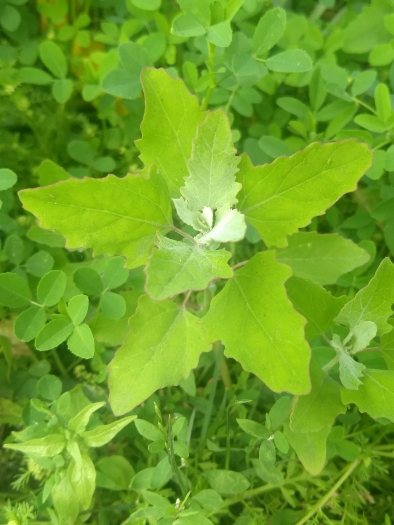Lamb’s Quarters
(Chenopodium album)
Lamb’s Quarters (Chenopodium album)
/
/

© Akiva
CC BY-SA 4.0
Image By:
© Akiva
Recorded By:
Copyright:
CC BY-SA 4.0
Copyright Notice:
Photo by: © Akiva | License Type: CC BY-SA 4.0 | License URL: http://creativecommons.org/licenses/by-sa/4.0/ | Uploader: caedocyon | Publisher: iNaturalist |























Estimated Native Range
Summary
Chenopodium album, commonly known as lamb’s quarters, is a fast-growing annual herb native to Europe and parts of Asia, including Northern India and Nepal. It is often found in disturbed soils, agricultural lands, and urban waste areas. This plant typically grows between 4-59 inches tall and features diamond-shaped, slightly toothed leaves with a whitish, mealy coating beneath. The inconspicuous mealy white flowers bloom from early summer to late fall and are not particularly showy. Lamb’s quarters can produce a large number of seeds, which contribute to its invasive potential in many regions.
Lamb’s quarters is valued for its edible leaves, which are rich in vitamins and minerals, and can be used similarly to spinach in cooking. It is a hardy plant that can tolerate poor soil conditions and is often found in nitrogen-rich soils. In cultivation, it requires minimal care, thriving in full sun to part shade and in soils with good drainage. While it is not commonly cultivated for ornamental purposes, it can be used as a green manure or cover crop to enrich the soil. Gardeners should be cautious, as it can become invasive outside its native range, outcompeting native plants and disrupting local ecosystems.CC BY-SA 4.0
Lamb’s quarters is valued for its edible leaves, which are rich in vitamins and minerals, and can be used similarly to spinach in cooking. It is a hardy plant that can tolerate poor soil conditions and is often found in nitrogen-rich soils. In cultivation, it requires minimal care, thriving in full sun to part shade and in soils with good drainage. While it is not commonly cultivated for ornamental purposes, it can be used as a green manure or cover crop to enrich the soil. Gardeners should be cautious, as it can become invasive outside its native range, outcompeting native plants and disrupting local ecosystems.CC BY-SA 4.0
Plant Description
- Plant Type: Herb
- Height: 1.5-7 feet
- Width: 1.5-3 feet
- Growth Rate: Moderate, Rapid
- Flower Color: Green, White
- Flowering Season: Spring, Summer, Fall
- Leaf Retention:
Growth Requirements
- Sun: Full Sun, Part Shade
- Water: Medium
- Drainage: Fast, Medium, Slow
Common Uses
Edible*Disclaimer: Easyscape's listed plant edibility is for informational use. Always verify the safety and proper identification of any plant before consumption., Low Maintenance
Natural Habitat
Disturbed soils, agricultural lands, and urban waste areas
Other Names
Common Names: Lamb’s Quarters, Pigweed, Fat-Hen, Giant Fat-Hen, Goosefoot
Scientific Names: , Chenopodium album, ? lanceolatum, Anserina candicans, Anserina candidans, Atriplex alba, Atriplex viridis, Blitum viride, Botrys alba var. pauper, Botrys albus
GBIF Accepted Name: